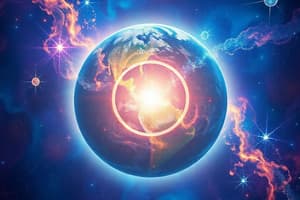Podcast
Questions and Answers
What does the Big Bang Theory propose about the initial state of the universe?
What does the Big Bang Theory propose about the initial state of the universe?
- The universe started as a black hole.
- The universe began with the formation of stars.
- The universe started as a singularity. (correct)
- The universe has always existed in its current form.
Which process is responsible for the formation of the first elements in the universe?
Which process is responsible for the formation of the first elements in the universe?
- Nucleosynthesis (correct)
- Condensation
- Nuclear fusion
- Fission
What evidence supports the Big Bang Theory regarding the expansion of the universe?
What evidence supports the Big Bang Theory regarding the expansion of the universe?
- The presence of black holes
- The abundance of dark matter
- Observation of redshift in distant galaxies (correct)
- Cosmic microwave background radiation
Who first proposed the Big Bang Theory?
Who first proposed the Big Bang Theory?
Which forces were present in the early universe as it began to expand?
Which forces were present in the early universe as it began to expand?
Which element is NOT one of the first formed in the universe according to the Big Bang Theory?
Which element is NOT one of the first formed in the universe according to the Big Bang Theory?
What does redshift refer to in astronomy?
What does redshift refer to in astronomy?
How does the Big Bang Theory describe the initial conditions of the universe?
How does the Big Bang Theory describe the initial conditions of the universe?
Study Notes
Theories of the Origin of the Universe
- Ancient civilizations attributed the universe's formation to deities and mythological explanations.
- Major religions like Islam, Judaism, and Christianity assert that a Supreme Being created the universe.
- With advancements in science and technology, many began to support scientific theories over religious explanations.
Big Bang Theory
- Proposed by Georges Lemaître in 1927, suggesting the universe began as a singularity containing all energy, space, and time.
- Approximately 14 billion years ago, this singularity began to expand, releasing energy and resulting in the formation of matter.
- Initially, the universe was in a hot, dense state where matter and energy interacted closely.
- Fundamental forces arose during early universe expansion: gravity, electromagnetic force, and strong and weak nuclear forces.
- These forces facilitated the formation of atoms, the basic building blocks of matter.
- Nucleosynthesis is the process where forming atoms combine to create the first elements: hydrogen and helium.
- Hydrogen and helium contributions led to the eventual formation of stars, galaxies, and other celestial bodies, including planets and comets.
- The Big Bang theory is widely accepted due to its strong supporting evidence and alignment with observations of the universe.
- Evidence includes the phenomenon of redshift, the increase in light wavelengths from distant galaxies, indicating they are moving away.
- In 1929, astronomer Edwin Hubble demonstrated that galaxies are receding, corroborating the universe's expansion.
Studying That Suits You
Use AI to generate personalized quizzes and flashcards to suit your learning preferences.
Description
Explore the various theories regarding the origin of the universe from ancient civilizations to modern scientific explanations. This quiz delves into how different cultures and religions have interpreted the cosmos' beginnings and how understanding has evolved over time.




